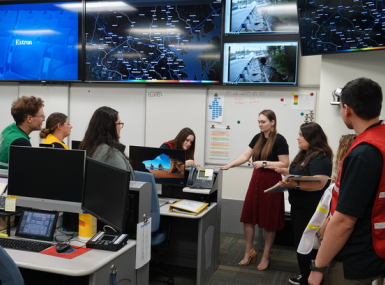COVID-19 relief dollars directly benefit residents
Author

Chris Coudriet
Upcoming Events
Related News

Key Takeaways
In April, the message I shared with you talked about the commissioners approval of a strategy to utilize the $45.4 million in federal money from the American Rescue Plan to address the economic and social challenges our community has endured throughout the pandemic.
The goal was simple — help businesses and families that have faced hardships caused by COVID-19 with a variety of assistance opportunities.
Some of these would provide financial relief or help pay for needed services. Others would offer much needed emotional support.
Back then, it was talk, and we all know talk is great, but it must become action. And I’m happy to say, it has become action.
Multiple initiatives were created and are continuing to develop as avenues to help our community. Today, we are seeing that money make its way to our citizens for the relief they desperately need.
Already, New Hanover County has provided around $2.3 million in funding to 106 locally owned businesses as part of the Hospitality, Retail and Service Grant Program established in partnership with the Wilmington Chamber of Commerce and City of Wilmington.
The program, all together, granted 192 businesses with over $4.2 million in funding through our partnership with the city. The grants ranged in size from $10,000-50,000, with 71 percent of the recipients being minority or women owned businesses.
And it’s not just about the businesses, but the workers they’ll need to operate. More than 70 individuals have already signed up for job training opportunities through Step Up Wilmington’s paid workforce development program being funded by the county, with more chances to learn coming soon.
Details on opportunities StepUp Wilmington is offering can be found at their website, StepUpWilmington.org.
Basic needs have also been addressed as part of our programs, with CFPUA’s water bill assistance program already helping families pay their outstanding balances. The program, which is shared between New Hanover County and the City of Wilmington, has already received more than 550 applications. To date, more than $16,000 in payments have been made with more requests being reviewed and approved each day. For more information on the program, visit CFPUA.org at financial assistance application.
The Broadband Assistance Program is helping families with school-aged children stay connected, so homework can actually be done at home instead of a community center or another public Wi-Fi location. More than 315 families have been approved so far and they are moving to the next steps of getting connected.
These families will now have in-home broadband service for up to two years to help their students stay connected and be more successful.
There are requirements to be approved, including enrollment in SNAP, Medicaid or Work First, and having school-aged children (5-18 years old) living at home. For more on the program, you can visit NHCGov.com/CovidRelief.
Support of residents so they can stay in their homes has been a key piece of our plan also. The county’s Mortgage Assistance Program has provided over $705,000 in assistance so far to homeowners; and the Workforce Housing Gap Rental Assistance Program is currently working with around 70 eligible residents to provide monthly subsidies of $200 per month for a single person and $300 per month for a multiple-person household. This is going to help fill a real need for these residents and ease their housing cost burden so they can live and thrive in our county.
Through ARP funds, we are also providing water and sewer infrastructure to Cape Fear Habitat for two affordable housing neighborhoods, as well as Eden Village for their tiny home community for the chronically homeless. Commissioners also recently approved using ARP funds for gap financing for the Starway Village affordable housing project, and we are currently in the design stages for water and sewer at Blue Clay Business Park which will aid economic development in the northern part of the county, leading to more, good paying jobs.
The county has also made it a priority to focus on the mental health of our community — specifically children, students and seniors. By adding capacity for our school mental health therapists and other important physical and mental health roles, we are working to ensure our schools and students have the support they so desperately need, and that our seniors have a lifeline for health and wellness.
And we’re just getting started.
As I said previously, the goal for this money has always been to help our community respond and begin recovering from the adversities that have manifested in the face of COVID-19.
I believe we are off to a good start, but the work remains ongoing and our commitment to help remains steadfast. This I know is certain – we are grateful for the opportunity to turn words into action and to help our community through this difficult time.
Attachments
Related News

DHS funding set to lapse, putting key county partners at risk of a partial shutdown
The U.S. Department of Homeland Security (DHS) is headed toward a funding lapse at 12:01 a.m. ET on Feb. 14 after the Senate failed this week to advance legislation to fund DHS for the remainder of Fiscal year (FY) 2026.

SBA issues new rule affecting local permitting in post-disaster rebuilding
The U.S. Small Business Administration (SBA) has issued an interim final rule that changes how rebuilding projects financed with SBA disaster loans following a Presidentially declared disaster interact with state and local permitting requirements.

Cross-training helps county 911 scale up for big emergencies
With training, Howard County, Md. staff help filter and respond to non-emergency requests for information and assistance during period of heavy 911 call volume.